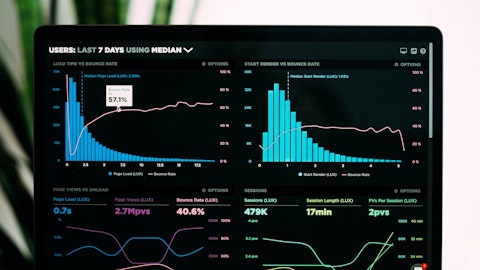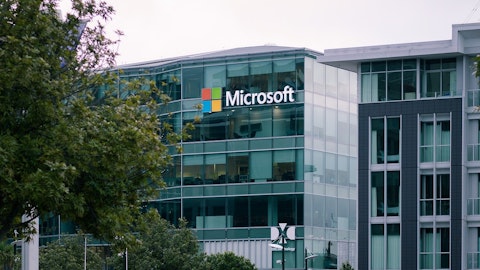2. Alphabet Inc. (NASDAQ:GOOG)
Value of Appaloosa Management‘s 13F Position: $192 Million (Class C GOOG shares)
Number of Hedge Fund Shareholders: 196 (GOOGL), 156 (GOOG)
David Tepper sold off 5,000 shares of Alphabet Inc. (NASDAQ:GOOG) during Q3, though his share count rose from 100,000 to just under 2 million courtesy of the stock’s 20-1 stock split in July. After being Tepper’s top stock pick for the previous year, GOOG slides back to second place due in part to shares losing 12% of their value during Q3. Chris Hohn’s TCI Fund Management owns 52.4 million GOOG shares worth $5.04 billion as of September 30, having 17.6% exposure to the stock in its 13F portfolio (and 23% exposure to both classes of the company’s shares).
Alphabet Inc. (NASDAQ:GOOG) shares haven’t been spared during the tech market rout this year, as investors worry about the near-term fate of the company’s monolithic advertising revenue in a recessionary environment. While 2023 could be rougher on that front, Alphabet has done just fine during the current year’s challenges, with ad revenue rising by 12% in Q3 to $165 billion. Google Cloud is also growing at a 40% rate and should bring some added and sustained clout to the company’s already stellar free cash flow generation in the years to come.
Mayar Capital laid out some of the reasons why Alphabet Inc. (NASDAQ:GOOG) dominant search engine is so valuable in the fund’s Q3 2022 investor letter:
“In early January this year – which admittedly feels like eons ago – US President Joe Biden was pushing Americans to take up the government’s offer of free COVID tests to help tackle the surging omicron variant. How did Biden respond when citizens asked about the availability of these tests?
“Google it!”
This advice, undoubtedly well-meant, was roundly scoffed at by the press, however. It seemed too obvious to be very helpful.
Anyway, the anecdote serves to introduce you to one of our largest holdings, Alphabet; the parent company of Google. Note that first, Alphabet’s original and core product – its search engine – has entered our common vocabulary as a verb. ‘Googling’ something has the same meaning as ‘researching’ or ‘finding an answer to’ something. Second the reason Biden’s advice was met with such opprobrium was because Googling something has become almost second nature to us now.
These two observations reveal a lot about Google’s strength in the search engine market, in which it has a share of over 90 percent. Because internet search is almost the prototypical network, Google has benefitted from – and we think is also protected by – the huge competitive advantage its scale brings – both to those asking the questions and those providing the answers. The Google search platform becomes increasingly useful to anyone seeking information as a greater volume of stuff becomes available. This starts a virtuous cycle that results in a colossal market share for Google itself. In the language of business strategists, Google benefits from vast network effects.
Because Google’s search results are viewed by billions of eyeballs every day, its search page ‘real estate’ is understandably very valuable to those with goods and services to sell. Advertising revenues from this ‘real estate’ as well as that from its other properties such as Mail, Maps, and so on, totaled almost USD 150b in 2021; amounting to almost 58% of the company’s revenues. Ad sales on YouTube, also owned by Alphabet, brought in another USD 28b. With the secular shift of the advertising spend to digital channels – over which Alphabet has a tight grip – we estimate the company has a share of around 40% of the digital advertising market and is probably the most valuable advertising property in the world…” (Click here to see the full text)





